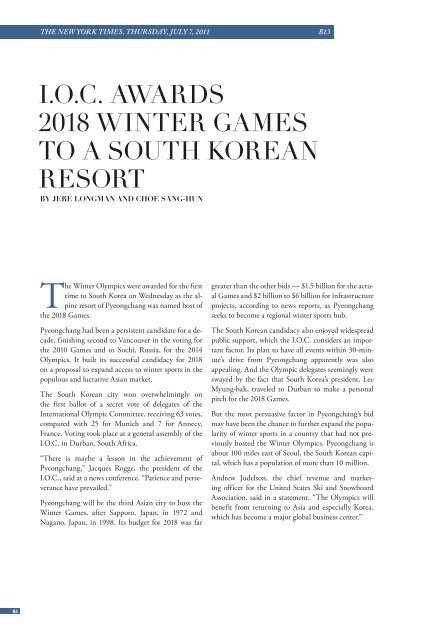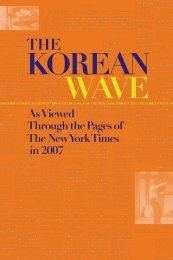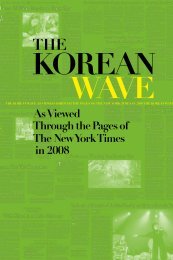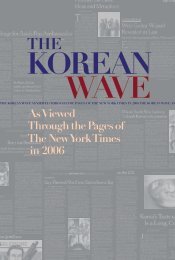The Korean Wave 2010-2011 - Korean Cultural Service
The Korean Wave 2010-2011 - Korean Cultural Service
The Korean Wave 2010-2011 - Korean Cultural Service
Create successful ePaper yourself
Turn your PDF publications into a flip-book with our unique Google optimized e-Paper software.
<strong>The</strong> New York Times, THURSDAY, JULY 7, <strong>2011</strong>B13I.O.C. Awards2018 Winter Gamesto a South <strong>Korean</strong>ResortBy JERÉ LONGMAN and CHOE SANG-HUN<strong>The</strong> Winter Olympics were awarded for the firsttime to South Korea on Wednesday as the alpineresort of Pyeongchang was named host ofthe 2018 Games.Pyeongchang had been a persistent candidate for a decade,finishing second to Vancouver in the voting forthe <strong>2010</strong> Games and to Sochi, Russia, for the 2014Olympics. It built its successful candidacy for 2018on a proposal to expand access to winter sports in thepopulous and lucrative Asian market.<strong>The</strong> South <strong>Korean</strong> city won overwhelmingly onthe first ballot of a secret vote of delegates of theInternational Olympic Committee, receiving 63 votes,compared with 25 for Munich and 7 for Annecy,France. Voting took place at a general assembly of theI.O.C. in Durban, South Africa.“<strong>The</strong>re is maybe a lesson in the achievement ofPyeongchang,” Jacques Rogge, the president of theI.O.C., said at a news conference. “Patience and perseverancehave prevailed.”Pyeongchang will be the third Asian city to host theWinter Games, after Sapporo, Japan, in 1972 andNagano, Japan, in 1998. Its budget for 2018 was fargreater than the other bids — $1.5 billion for the actualGames and $2 billion to $6 billion for infrastructureprojects, according to news reports, as Pyeongchangseeks to become a regional winter sports hub.<strong>The</strong> South <strong>Korean</strong> candidacy also enjoyed widespreadpublic support, which the I.O.C. considers an importantfactor. Its plan to have all events within 30-minute’sdrive from Pyeongchang apparently was alsoappealing. And the Olympic delegates seemingly wereswayed by the fact that South Korea’s president, LeeMyung-bak, traveled to Durban to make a personalpitch for the 2018 Games.But the most persuasive factor in Pyeongchang’s bidmay have been the chance to further expand the popularityof winter sports in a country that had not previouslyhosted the Winter Olympics. Pyeongchang isabout 100 miles east of Seoul, the South <strong>Korean</strong> capital,which has a population of more than 10 million.Andrew Judelson, the chief revenue and marketingofficer for the United States Ski and SnowboardAssociation, said in a statement, “<strong>The</strong> Olympics willbenefit from returning to Asia and especially Korea,which has become a major global business center.”In a final pitch to I.O.C. delegates on Wednesday,Pyeongchang’s bid leaders displayed a map showingthat 19 of the previous 21 Winter Games hadbeen held in Europe and North America, suggesting itwas time to give Asia another chance.Wednesday’s vote was in keeping with recent attemptsby the Olympics and soccer’s World Cup to bringthe world’s biggest sporting events to places wherethey had not been previously held. <strong>The</strong> 2014 WinterGames will go to Russia for the first time and the 2016Summer Games will be held for the first time in SouthAmerica, with Rio de Janeiro as host.<strong>The</strong> motto of the Pyeongchang bid was “new horizons,”which Cho Yang-ho, the bid committee’s chairman,described as an opportunity to “expand wintersports to new regions of the world and give opportunityto new peoples to access to the Winter Games.”Park Yong-sung, head of the South <strong>Korean</strong> OlympicCommittee, said that Pyeongchang’s victory “gavenew hope for those developing countries, because inthe past we think the Olympics are only for the richand big countries.”South Korea has shown its ability to organize major internationalsporting events over the past two decades.In addition to being the host of the 1988 SummerOlympics, South Korea was the co-host with Japan ofthe 2002 World Cup.Yet, corruption involving high-ranking Olympic officialsfrom South Korea has also brought embarrassmentto the I.O.C. Kim Un-yong, a former I.O.C.vice president, resigned in 2005 after being convictedof embezzlement. Lee Kun-hee, the chairman ofSamsung, an Olympic sponsor, relinquished his dutiesas an I.O.C. delegate in 2008 and was convicted of taxevasion; he was later pardoned and resumed his rolewith the I.O.C. last year.Park, the head of South Korea’s Olympic Committee,was convicted of embezzlement but pardoned in 2007.Cho, the chairman of Pyeongchang’s bid committeeand of <strong>Korean</strong> Air, was charged with tax evasion in1999 and given a three-year prison term, but settledwith the government for $12 million.<strong>The</strong> news of Pyeongchang’s victory came near midnightin South Korea. In the resort, villagers dancedand waved national and Olympic flags.“This is a victory for the people of South Korea,” Lee,the country’s president, said from Durban.Choe Sang-hun reported from Seoul, South Korea.86Copyright © <strong>2011</strong> by <strong>The</strong> New York Times Co. Reprinted with permission.87





